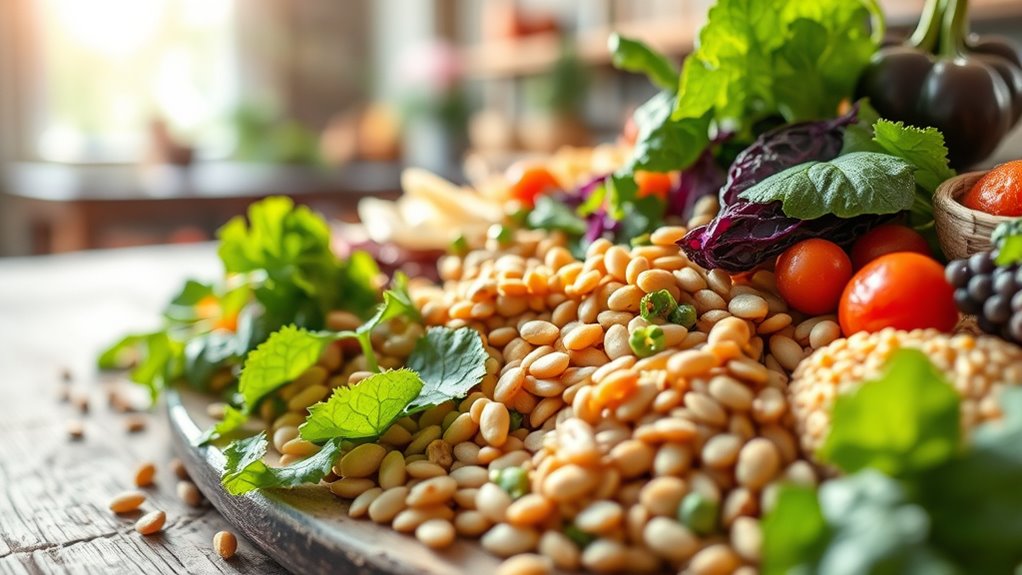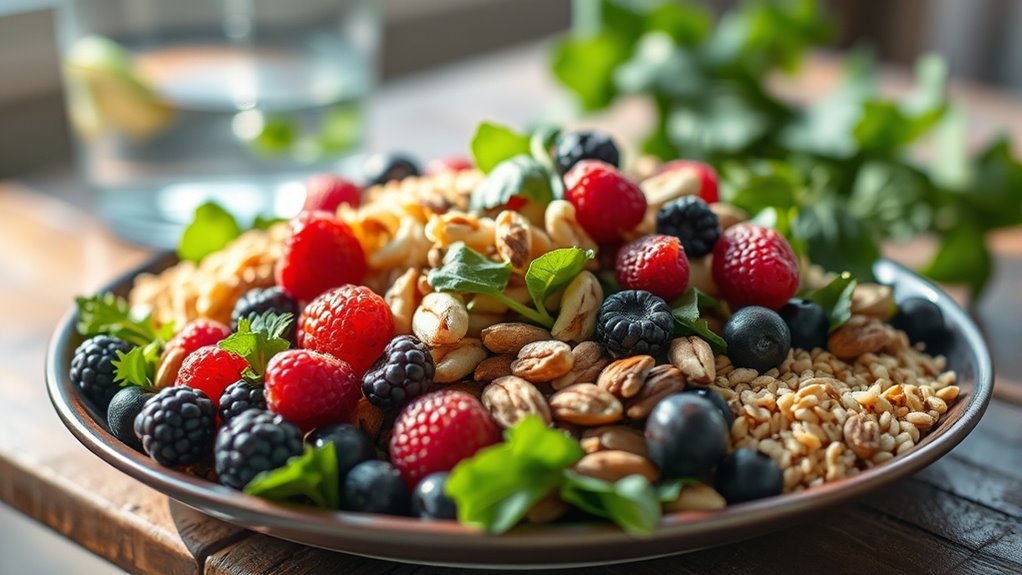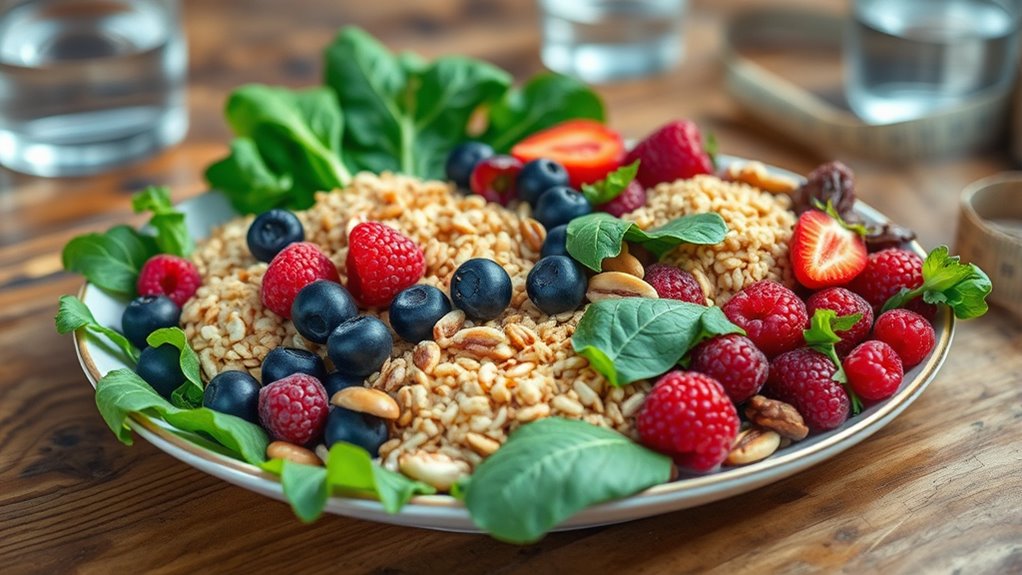A fiber-diverse diet boosts your gut microbiome’s health by encouraging beneficial microbes like Bifidobacteria and Lactobacilli. These microbes produce neurotransmitters like serotonin and GABA, which help regulate your mood and reduce feelings of anxiety or depression. This complex chemical conversation happens via the gut-brain axis, especially through the vagus nerve. Keep exploring, and you’ll understand how fueling your microbiome rewires your mood pathways for better mental well-being.
Key Takeaways
- A fiber-diverse diet boosts microbial diversity, supporting neurotransmitter production like serotonin and GABA that regulate mood.
- Beneficial microbes ferment dietary fibers into metabolites that influence brain pathways via the gut-brain axis.
- Increased fiber intake enhances gut microbiome resilience, promoting emotional stability and reducing stress-related mood fluctuations.
- A varied, fiber-rich plate strengthens gut-brain communication through the vagus nerve and immune signaling.
- Consistent consumption of fiber-rich foods rewires mood pathways by fostering a resilient, balanced microbiome that supports mental well-being.
Understanding the Gut Microbiome and Its Role in Health

The gut microbiome refers to the vast community of trillions of microorganisms living in your digestive system. These gut bacteria play an essential role in your overall health by aiding digestion, producing fundamental nutrients, and supporting your immune system. Microbial diversity is key; a wide variety of gut bacteria helps maintain balance and resilience against harmful pathogens. When your gut microbiome is diverse, it’s better equipped to handle changes in diet, stress, and illness. A diverse microbiome also contributes to color accuracy in gut functions, promoting optimal health outcomes. Conversely, a less diverse microbiome can lead to issues like inflammation and metabolic problems. You can support your gut bacteria by eating a fiber-rich diet, which fuels beneficial microbes and promotes a healthy, balanced microbiome that’s indispensable for your long-term health.
The Brain-Gut Connection: How Your Gut Influences Your Mood

Your gut and brain constantly communicate through nerve signals, hormones, and immune responses, shaping how you feel. The microbes in your gut influence your mood regulation by producing neurotransmitters and other chemicals. What you eat can also impact this connection, affecting both your gut health and mental well-being.
Gut-Brain Communication Pathways
Since the gut and brain constantly communicate, this connection notably influences your mood and mental health. Your gut sends signals through pathways like microbial metabolites, which can affect brain chemistry. A key route is the vagus nerve, a major highway transmitting information directly between your gut and brain. When beneficial microbes produce compounds, these microbial metabolites travel via the vagus nerve, modulating mood and stress responses. This bi-directional system allows your gut to influence your mental state, making a healthy microbiome essential for emotional balance. Additionally, beneficial ingredients such as fiber promote the growth of helpful microbes, further supporting this communication system and enhancing microbiome diversity.
Microbes and Mood Regulation
Emerging research reveals that the microbes in your gut play a essential role in regulating your mood and emotional well-being. When your microbial diversity is high, your gut produces neurotransmitters like serotonin and GABA, which influence your mood directly. Taking probiotic supplements can help boost this diversity, supporting a healthier gut-brain connection. These beneficial microbes communicate with your brain via the vagus nerve and immune pathways, affecting stress levels and emotional responses. A balanced microbiome may reduce anxiety and depression symptoms, highlighting the importance of maintaining microbial health. By fostering a diverse, fiber-rich diet and considering probiotics, you can positively impact your mood through your gut’s microbial community, reinforcing the powerful link between your gut health and emotional stability.
Impact of Diet on Brain
Have you ever wondered how the food you eat can influence your mood? Your diet directly impacts your gut microbiome, which in turn affects your brain. Consuming fiber-rich foods promotes a healthy microbiome, supporting mental well-being. Probiotic supplements can introduce beneficial bacteria that help regulate mood pathways, while microbiome therapies aim to restore balance after disruptions. A diverse, fiber-filled plate fuels your gut bacteria, producing neurotransmitters like serotonin that influence your emotions. When your microbiome is balanced, it sends positive signals to your brain, reducing stress and anxiety. Additionally, understanding the role of gut microbiome diversity can help you make more informed dietary choices for mental health. Conversely, poor diet can weaken this connection, leading to mood swings. By choosing mindful, gut-friendly foods and considering probiotic supplements or therapies, you actively support your mental health through your diet.
The Impact of Dietary Fiber on Microbial Diversity

Eating more dietary fiber can increase the variety of your gut microbes, making your microbiome more resilient. This diversity not only supports digestion but also boosts your brain function. By choosing fiber-rich foods, you’re helping your gut and mind stay healthier. Incorporating a variety of plant-based foods fosters microbial diversity, which is essential for overall health and well-being. Supporting this diversity through dietary choices can lead to improved mental clarity and emotional stability. Additionally, understanding the importance of personal debt forgiveness bills can help you manage your finances better, reducing stress that might negatively impact your mental health.
Boosts Microbial Variety
Dietary fiber plays a crucial role in increasing the diversity of your gut microbiome. When you consume a fiber-rich diet, you support microbial resilience by encouraging a wider range of bacteria to thrive. Fiber fermentation provides food for many different microbes, promoting a balanced ecosystem. This variety helps your gut adapt better to changes and resist harmful bacteria. As a result, your microbiome becomes more resilient, capable of recovering quickly from disturbances like antibiotics or illness. The more diverse your microbial community, the stronger your gut’s defenses, and the more efficient your digestive processes become. By prioritizing fiber in your meals, you’re actively fostering a vibrant, resilient microbiome that benefits your overall health and mood.
Enhances Brain Function
Since a diverse gut microbiome influences more than just digestion, it also plays an essential role in brain function, and dietary fiber is key to maintaining this diversity. When you eat a fiber-rich diet, you promote microbial diversity, which supports the production of neuroactive compounds that boost cognitive performance and mood. A resilient gut microbiome enhances gut resilience, helping it adapt to stress and environmental changes, ultimately benefiting your brain health. The more varied your microbial community, the better your brain can process information, regulate emotions, and improve memory. Incorporating skincare patches into your routine can also protect and nurture the skin barrier, supporting overall health. By prioritizing fiber in your meals, you’re not just nourishing your gut—you’re rewiring your mood pathways and sharpening your mental clarity through a resilient, diverse microbiome.
How a Fiber-Rich Diet Alters Microbial Composition

A fiber-rich diet can considerably shift the balance of your gut microbiome by encouraging the growth of beneficial bacteria. When you include diverse fiber sources like fruits, vegetables, whole grains, and legumes, you provide nourishment for probiotic strains that thrive on these fibers. These fibers act as prebiotics, fueling the growth of bacteria such as Bifidobacteria and Lactobacilli, which contribute to a healthier gut environment. As these beneficial microbes multiply, they outcompete harmful bacteria, creating a balanced microbial composition. This shift enhances digestion, reduces inflammation, and supports overall gut function. Understanding microbiome dynamics can help you make more informed dietary choices to optimize your well-being. Additionally, adopting a diverse fiber intake supports the development of a resilient microbiome capable of influencing mental health pathways. Incorporating a variety of fiber sources also stimulates the production of beneficial metabolites like short-chain fatty acids, which play a crucial role in maintaining gut-brain communication.
Microbes and Neurotransmitters: The Chemical Conversation in Your Gut

Your gut microbiome isn’t just involved in digestion; it also communicates with your brain by producing and regulating neurotransmitters—chemical messengers that influence your mood, stress levels, and overall mental health. Certain probiotic strains play a key role in neurotransmitter synthesis, directly affecting how you feel. For example, some microbes produce serotonin, the “happy hormone,” while others generate GABA, which helps reduce anxiety. These microbes act as tiny chemical messengers, sending signals through the gut-brain axis and shaping your emotional state. By supporting a diverse range of probiotic strains, you can enhance this chemical conversation, promoting better mood regulation and mental resilience. Additionally, a diverse microbiome is essential for maintaining the complex interactions that support neurotransmitter balance, underscoring the importance of a fiber-rich diet for mental well-being. Moreover, research suggests that a fiber‑diverse plate can positively influence the production of these critical neurotransmitters, further emphasizing the connection between diet and mental health.
Rewiring Mood Pathways: The Science Behind Dietary Changes

Emerging research reveals that dietary choices can directly reshape your brain’s mood pathways by influencing the gut microbiome. When you eat a fiber-rich diet, you promote beneficial microbial signaling, which impacts how your gut communicates with your brain. These microbes produce metabolites that can cross the gut barrier, affecting neural pathways associated with mood. Additionally, your gut enzymes play a pivotal role by breaking down food components into compounds that support healthy microbes. This process enhances the production of neuroactive substances like serotonin and GABA, helping to modulate your mood and stress levels. Incorporating nutrient-dense foods such as chia seeds can further support this microbial activity and promote a healthy gut-brain connection. By adjusting your diet, you actively influence these microbial signals and enzymatic activity, rewiring your mood pathways for better emotional resilience and mental well-being.
Practical Tips for Incorporating More Fiber Into Your Meals

Adding more fiber to your meals can be simple and delicious with a few strategic choices. First, incorporate fermentation techniques like making yogurt or sauerkraut to boost fiber and beneficial probiotics. Second, plan your meals ahead with meal prep strategies—pre-chopping vegetables or batch-cooking whole grains ensures fiber-rich options are ready to go. Third, add fiber-dense ingredients such as beans, lentils, or chia seeds into salads, soups, or smoothies. Fourth, experiment with whole grain alternatives like brown rice, whole wheat pasta, or barley instead of refined grains. These small changes make it easier to meet your daily fiber goals, supporting gut health and mood regulation. Additionally, understanding the importance of gut microbiome health can motivate you to incorporate diverse fiber sources. Research shows that a well-balanced microbiome can positively influence mood pathways, making your dietary choices even more impactful. Supporting microbiota diversity through varied fiber intake enhances overall health and resilience. Incorporating a variety of fiber sources supports the diversity of your gut microbiota, which is key to overall health. With consistency, these tips become natural parts of your routine, making fiber intake enjoyable and sustainable.
The Long-Term Benefits of a Diverse Microbiome for Mental Well-Being

A diverse microbiome can make you more resilient to stress and better at managing your emotions over time. When your gut health improves, you may notice a reduction in anxiety and mood swings. Building this diversity offers lasting mental health benefits that can enhance your overall well-being.
Enhanced Stress Resilience
Having a diverse gut microbiome can substantially strengthen your ability to handle stress over the long term. Gut bacteria play a key role in building mental resilience by influencing your stress response. Here’s how a vibrant microbiome enhances your stress resilience:
- Boosts Neurotransmitter Production: Certain gut bacteria produce mood-stabilizing chemicals like serotonin.
- Reduces Inflammation: A diverse microbiome lowers inflammation linked to heightened stress sensitivity.
- Balances Cortisol Levels: It helps regulate cortisol, your primary stress hormone.
- Strengthens Gut-Brain Communication: A healthy microbiome improves signaling pathways that manage stress responses.
Improved Mood Regulation
When your gut microbiome is diverse, it actively promotes better mood regulation over the long term. A varied microbiome supports the production of neurotransmitters like serotonin and GABA, which are essential for stable mood. Engaging in microbiome therapy—such as consuming fiber-rich foods and fermented products—can enhance this diversity, strengthening your mental resilience. Additionally, incorporating mental health supplements that nurture beneficial bacteria can further stabilize your mood pathways. Over time, these practices help establish a resilient gut-brain connection, making you less vulnerable to mood swings and emotional imbalances. Maintaining a diverse microbiome isn’t just about digestion; it’s a strategic approach to fostering sustained mental well-being and emotional stability.
Reduced Anxiety Risks
Maintaining a diverse gut microbiome plays a crucial role in reducing long-term anxiety risks. A varied gut bacteria profile influences brain chemistry, helping you stay calm and resilient. To boost gut bacteria diversity, consider:
- Incorporating probiotic supplements to introduce beneficial bacteria.
- Eating a fiber-rich, plant-based diet that feeds your microbiome.
- Reducing processed foods that disrupt gut balance.
- Engaging in regular physical activity to support gut health.
These steps strengthen your microbiome, which in turn helps regulate stress hormones and supports mental well-being. A diverse microbiome acts as a buffer against anxiety, promoting a more stable mood over time. Prioritizing gut health isn’t just about digestion; it’s a key to long-term mental resilience.
Potential Challenges and How to Overcome Them When Changing Your Diet

Changing your diet can present unexpected hurdles, especially when your gut microbiome needs time to adapt. Microbial adaptation may cause temporary digestive discomfort or cravings, making it hard to stick to new eating patterns. To overcome this, focus on gradual dietary changes rather than abrupt shifts, giving your microbiome time to adjust. Maintaining dietary compliance requires patience and consistency; track your progress and celebrate small wins to stay motivated. Hydration and fiber intake support microbial diversity and ease digestion during this transition. Remember, setbacks are normal—don’t get discouraged. Reframe challenges as part of the process, and stay committed to your goal of a healthier, more balanced gut. With perseverance, your microbiome will adapt, rewiring your mood pathways for the better.
Future Directions in Microbiome Research and Mental Health

As research continues to uncover how the gut microbiome influences mental health, new opportunities emerge for targeted therapies and personalized interventions. Advances in understanding metabolic signaling and microbial metabolites open exciting paths. You might see:
- Development of therapies that modulate microbial metabolites to enhance mood regulation.
- Personalized diets tailored to optimize metabolic signaling pathways linked to mental wellness.
- Use of probiotics or prebiotics designed to influence specific microbial communities affecting brain function.
- Biomarker identification for early detection of mental health issues based on microbiome profiles.
These innovations could revolutionize mental health treatment by directly targeting gut-brain communication, making interventions more effective and individualized. The future holds promise for translating microbiome insights into practical solutions for mental well-being.
Frequently Asked Questions
Can Probiotic Supplements Replace Dietary Fiber for Gut Health?
Probiotic efficacy can’t fully replace dietary fiber as a fiber alternative. While probiotics introduce beneficial bacteria, they don’t provide the prebiotic fibers needed to nourish those microbes. Without fiber, your gut microbes lack fuel, which hampers their ability to support your health and mood. To truly promote gut health, you should combine probiotic supplements with fiber-rich foods, ensuring a balanced approach rather than relying solely on supplements.
How Quickly Can Dietary Changes Impact Mood via the Microbiome?
You can notice mood improvements within days to a few weeks, thanks to rapid microbiome shifts caused by dietary changes. When you introduce more fiber-rich, diverse foods, your gut bacteria adapt quickly, releasing mood-boosting neurotransmitters. While everyone’s different, consistent healthy eating can start rewiring your mood pathways relatively fast, often within a week or two, leading to a noticeable positive impact in your mental well-being.
Are There Specific Foods That Optimize Neurotransmitter Production in the Gut?
Imagine your gut as a symphony, where certain foods are the master conductors. Fermented foods like yogurt and kimchi boost serotonin, while prebiotic-rich diets with garlic, onions, and bananas feed beneficial bacteria that produce dopamine and GABA. By including these in your meals, you optimize neurotransmitter production, helping you feel more balanced and uplifted. Think of it as tuning your inner melody for better mood and mental clarity.
What Are Signs of an Imbalanced Gut Microbiome Affecting Mental Health?
If your gut microbiome is imbalanced, you might notice emotional instability, like sudden mood swings or anxiety, and digestive discomfort, such as bloating or irregularity. These signs indicate your gut isn’t effectively supporting your mental health. Pay attention to how you feel physically and emotionally, and consider adjusting your diet to include more fiber and probiotic-rich foods. Improving your gut health can help stabilize your mood and reduce discomfort.
How Does Stress Influence Gut Microbial Diversity and Mood?
Stress impacts your gut microbial diversity by reducing microbial resilience, making your microbiome more vulnerable to imbalance. When you’re stressed, your body releases hormones that can disrupt beneficial bacteria, leading to mood fluctuations and mental health issues. To support your gut and mood, manage stress through relaxation techniques and maintain a fiber-diverse diet. This helps preserve microbial resilience, ensuring your gut microbiome remains balanced and resilient against stress’s negative effects.
Conclusion
By embracing a fiber-rich, diverse plate, you’re unleashing a hidden universe inside you—one that can transform your mood, sharpen your mind, and supercharge your happiness. Imagine rewiring your brain’s pathways with every colorful vegetable and whole grain you eat, turning your gut into a powerhouse of positivity. So, start today—because this tiny dietary shift could unlock a wave of mental clarity and joy so powerful, it might just change your life forever.










